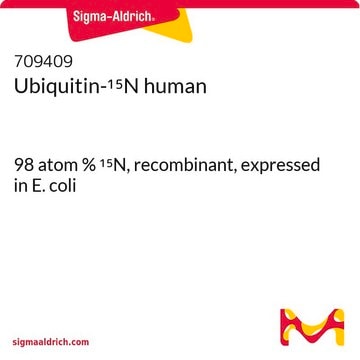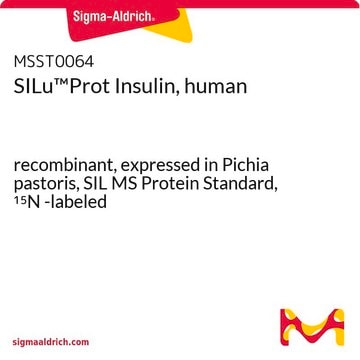General description
SILu™ Prot PTX3 is a recombinant, stable isotope-labeled human PTX3 which incorporates [13C6, 15N4]-Arginine and [13C6, 15N2]-Lysine. Expressed in human 293 cells, it is designed to be used as an internal standard for bioanalysis of PTX3 in mass-spectrometry. SILu™ Prot PTX3 is a recombinant glycosylated human protein expressed in human 293 cells. It is a homooctamer and a homodecamer consisting of 364 amino acids (monomer) with a calculated molecular weight of 40 kDa. It contains no tags.
Biochem/physiol Actions
Pentraxin 3 (PTX3) is a secreted glycosylated protein belonging to the pentraxin superfamily1. PTX3 is rapidly produced and released by several cell types, in particular by mononuclear phagocytes, dendritic cells (DCs), fibroblasts and endothelial cells in response to primary inflammatory signals (e.g., toll-like receptor [TLR]engagement, TNFα, IL-1β)1. PTX3 behaves as an acute phase response protein, as the blood levels of PTX3, low in normal conditions (about 25 ng/mL in the mouse, < 2 ng/mL in humans), increase rapidly (peaking at 6–8 h after induction)and dramatically (200–800 ng/mL)during endotoxic shock, sepsis and other inflammatory and infectious conditions, correlating with the severity of the disease. Under these conditions, PTX3 is a rapid marker for primary local activation of innate immunity and inflammation2-6. anti-apoptotic cell survival2, cell cycle regulation3, cell adhesion4, tissue remodeling5 and lipid transportation6. PTX3 gene expression in human endothelial cells is suppressed to a greater extent by pitavastatin than the expression of 6,000 other human genes that have been examined, suggesting that PTX3 may be a novel biomarker for inflammatory cardiovascular disease8.
Sequence
ENSDDYDLMYVNLDNEIDNGLHPTEDPTPCACGQEHSEWDKLFIMLENSQMRERMLLQATDDVLRGELQRLREELGRLAESLARPCAPGAPAEARLTSALDELLQATRDAGRRLARMEGAEAQRPEEAGRALAAVLEELRQTRADLHAVQGWAARSWLPAGCETAILFPMRSKKIFGSVHPVRPMRLESFSACIWVKATDVLNKTILFSYGTKRNPYEIQLYLSYQSIVFVVGGEENKLVAEAMVSLGRWTHLCGTWNSEEGLTSLWVNGELAATTVEMATGHIVPEGGILQIGQEKNGCCVGGGFDETLAFSGRLTGFNIWDSVLSNEEIRETGGAESCHIRGNIVGWGVTEIQPHGGAQYVS
Physical form
Supplied as a lyophilized powder containing phosphate buffered saline
Legal Information
This product is licensed under U.S. Patent No. 7,396,688 and foreign counterparts from E. I. du Pont de Nemours and Company. The purchase of this product conveys to the buyer the nontransferable right to use the purchased amount of the product for research and development only, including services for a third party for consideration. The buyer cannot sell or otherwise transfer this product, its components or materials made using this product or its components to a third party. Information about licenses for excluded uses is available from: E. I. du Pont de Nemours and Company; Attn: Associate Director, Commercial Development; DuPont Experimental Station E268; 200 Powdermill Rd.; Wilmington, DE 19803; 1-877-881-9787 (voice), 1-302-695-1437 (fax), licensing@dupont.com.
SILu is a trademark of Sigma-Aldrich Co. LLC







